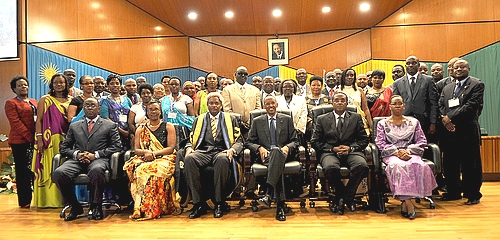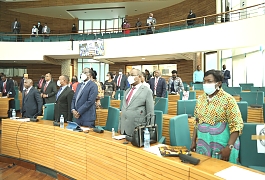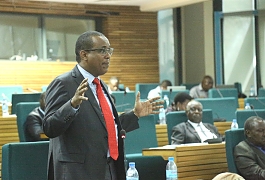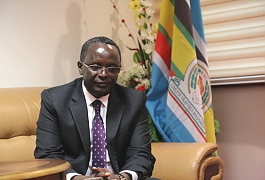EALA wound its business in Kigali, Rwanda, on September 15, 2011. The two week plenary which started on September 5, 2011, was the first meeting of the fifth session of the Assembly. Among the motions adopted on the last day of business was one urging the Assembly and national parliaments to consider annually celebrating the International Day of Democracy which falls on September 15.
The motion was moved by Hon Patricia Hajabakiga, who said that the day was instituted by the United Nations in 2007, pointing out that more than 75 Parliaments in the globe have staged special events to mark the occasion.
“A truly living democracy depends on the active contribution of citizens’ participation in shaping their political future and co-operation within political institutions, thus being a decisive factor for the smooth functioning of democratic institutions,” Hon Hajabakiga added, shortly before the open debate that ensued.
During the two week period, Parliament passed two key Bills – The EALA Elections Bill 2011 and the EALA Parliamentary Institute Bill 2011.
The object of the EALA Elections Bill 2011 moved by the Chairperson of Legal Rules and Privileges Committee, Hon Frederic Ngenzebuhoro, is to provide a framework for the laws, regulations and procedures relating to elections of Members to the East African Legislative Assembly and for matters incidental thereto. The Bill has three parts, part one being Preliminary while part two constitutes clauses on elections of Members of the Assembly. Part three of the Bill consists of the Miscellaneous clauses.
The EALA Parliamentary Institute Bill 2011 hopes to establish a Parliamentary Institute to provide training on parliamentary procedures and practices and thus widening and deepening co-operation among Partner States in political, economic and social fields for mutual benefit. The Bill further envisages establishment of a forum which fortifies linkages with law makers in the African region and enhances collaboration with similar institutions in the African region and globally.
Both Bills received overwhelming support on the floor of the House. The Bills shall now be assented to by the Heads of State before they become law.
EALA however adjourned debate on the EAC Transboundary Ecosystems Bill 2010 up until the next plenary in November 2011. This followed a motion for adjournment moved by the Council of Ministers under Rule 31 Section C of the Rules of Procedure of the EALA.
Reports Adopted
The Report of the Committee on Accounts on Oversight Assessment on Internal Audit Systems of EAC Organs and Institutions was presented to an attentive House by the Chairperson of the Accounts Committee, Hon. Bernard Mulengani.
The Report made public its findings of the recent oversight assessment carried out at the EAC Organs and Institutions including EALA, the East African Court of Justice (EACJ), Secretariat and the Lake Victoria Basin Commission.
EALA further debated and approved the Report of the Committee on Communication, Trade and Investment on Capital Markets Regionalisation. The report follows the oversight work of the Committee on Communication, Trade and Investment (CTI). The objective of the oversight activity which took place on August 28-31, 2011 in the Partner States was to assess the status of implementation of Capital Markets’ regionalisation projects in East Africa. The assessment saw the Committee visit the Capital Market Authorities in Dar es Salaam, Nairobi and Kigali.
Also debated and adopted was the Report of the Workshop on Policies and Strategies on Education, Research, Science and Technology in East Africa towards the enhancement of Innovations and Appropriate Technology. The Report summed up deliberations of the workshop held in Dodoma, Tanzania, on August 19-20, 2011 and organized by EALA’s General Purpose Committee. The two day workshop had sought to examine how the EAC is organized in terms of policies and strategies to effectively tap on research, science and appropriate technology to bring about development.
Presenting the findings, Hon Sebtuu Nassor, Chairperson of the Committee on General Purpose, noted that Science Technology and Innovation (STI) policies and legal frameworks in the region were at an infancy stage and this was coupled by lack of a critical mass of highly trained STI human resource and poor retention schemes of human capital. The Committee presented twelve key recommendations and the priority areas terming budgetary allocation as the top most priority for the region. The Chairperson also urged the EAC Partner States to provide adequate funding and budgetary allocations for sustainable research and development activities, noting that, the African Union’s decision to allocate a minimum of 1% of the Country’s Gross Domestic Product to research issues needed to be adhered to.
Resolution congratulating South Sudan
Barely coming two months after the independence of South Sudan, the Assembly moved a Resolution congratulating the landmark independence of the South Sudan. EALA urged the EAC Partner States through the Council of Ministers to pursue sustained and increased trade, political and social co-operation with South Sudan, noting that all parties were expected to reap from the independence of the world’s youngest State.
The Resolution moved by Hon. Dan Kidega, EALA MP, received overwhelming support on the floor of the House. The Resolution noted in part that the struggles of the citizens of South Sudan were of regional, continental and international concern which resulted in to a Comprehensive Peace Agreement (CPA) in 2005, to guide the future relations between the South and North Sudan.
With that, EALA urged the EAC Partner States through the Council of Ministers to pursue sustained and increased trade, political and social co-operation with South Sudan, noting that all parties were expected to reap from the independence of the world’s youngest State.
“The relationship between the political leaders of the EAC and the South Sudan which are strong and cordial are expected to be intensified following the independence of South Sudan”, Hon Kidega said.
Priority questions
A number of priority questions were asked by the Members and responded to by the EAC Council of Ministers.
-END-




